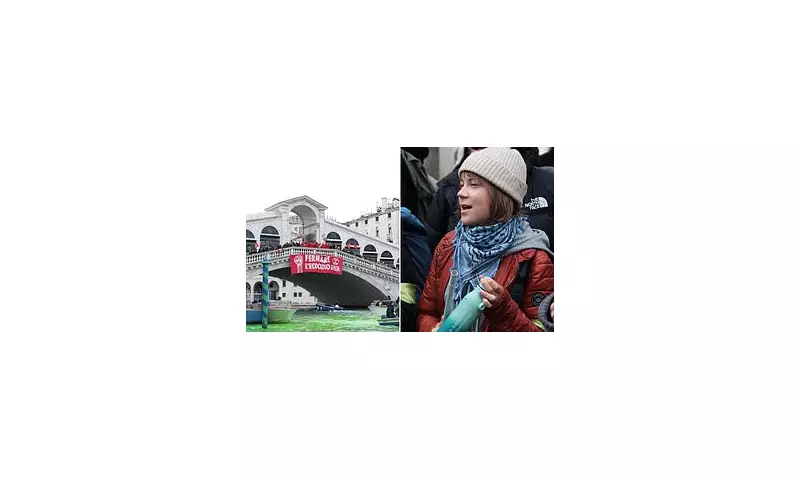
Prominent climate campaigner Greta Thunberg has been prohibited from entering Venice following a weekend of environmental protests that saw the city's iconic Grand Canal turned a vivid shade of green.
The 22-year-old Swedish activist was among a group of 35 individuals from Extinction Rebellion who were each issued with a €150 (£130) fine and a 48-hour ban from the historic Italian city after a series of coordinated demonstrations.
The Venice Demonstration and Its Aftermath
The incident occurred as Thunberg participated in a protest organised by the environmental group, during which activists dumped an environmentally harmless green dye into the Grand Canal. The dramatic visual stunt was accompanied by the unfurling of a banner bearing the words 'Stop Ecocide' from the famous Rialto Bridge.
In a separate action, campaigners staged a flash-mob where individuals dressed in red with veils covering their faces moved slowly through crowds of tourists, creating a striking visual contrast to the city's usual pace.
The protest was met with immediate condemnation from local authorities. Luca Zaia, the governor of Veneto, described the action as 'a disrespectful gesture for our city, its history, and its fragility.' He expressed particular surprise at Thunberg's involvement, suggesting the protest seemed designed more for personal visibility than genuine environmental awareness.
Broader Context of Italian Climate Protests
The Venice action was part of a larger wave of demonstrations across Italy, with Extinction Rebellion targeting 10 sites nationwide including cities such as Bologna, Genoa, Milan, and Turin. These coordinated protests coincided with the conclusion of the Cop30 United Nations climate conference in Belém, Brazil, where delegates failed to reach a consensus on phasing out fossil fuels.
The activist group specifically accused Italy of being among the countries that worked to block the most ambitious proposals during the climate talks. The Cop30 negotiations had extended into overtime as delegates struggled to agree on whether to include explicit references to fossil fuels in the final agreement.
Despite efforts by the European Union to secure a deal featuring a 'roadmap' for phasing out fossil fuels, the final text omitted such language following opposition from oil-producing nations led by Saudi Arabia. The resulting agreement instead calls on countries to voluntarily accelerate their climate actions, echoing the consensus reached at the previous COP28 summit in Dubai.
Thunberg's Recent Activism and Detention Experience
The Venice ban comes amid Thunberg's continued high-profile activism on multiple fronts. The Swedish campaigner recently revealed details of her detention by Israeli forces after participating in the Global Sumud Flotilla attempt to deliver humanitarian aid to Gaza.
Thunberg described being held for five days at Ketziot prison in the Negev desert, where she alleged she and other detainees were subjected to harsh conditions including bug-infested cells, limited access to clean water, and psychological mistreatment from guards. She reported that military officers took selfies with her and later vandalised her luggage with offensive graffiti.
Despite these experiences, Thunberg initially declined to publicise her treatment, emphasising that her suffering paled in comparison to the daily realities faced by Palestinians in Gaza. Israel's foreign ministry has consistently denied allegations of mistreating the detainees.
The weekend's events in Venice underscore the ongoing tensions between climate activists and authorities across Europe as environmental groups employ increasingly visible tactics to draw attention to what they describe as governmental inaction on the climate crisis.





